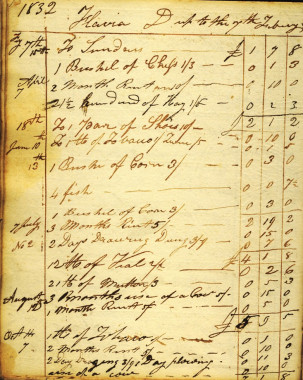Ledger.13.jpg

A page from the Luke Ledger, 1832.
"Flavia" appeared in the Luke Ledger in 1832 by only her first name. She was most likely a black woman in the services of Mr. Luke. One can assume she was from the black community by the fact that her name was a typical "slave name" of the period. She was also not listed with a surname as white women were throughout the ledger. The difficulty of her labour is another indication. Whereas white women worked in the domestic sphere, black women tended to work in the fields or performed heavy labour. For her purchases of wood chips, corn, oats, hay and mackerel, Flavia chopped logs, pulled dung, mended a fence, planted 'tators', shaved sheep and worked on road construction. Her only luxury items purchased were a pound of tobacco and a pair of shoes. Her name disappears from the ledger within the year but other names throughout the ledger such as Caesar, Salla, Joe, Lucia, and Cato provide the slightest hint of the existence of the black community that lived and work
"Flavia" appeared in the Luke Ledger in 1832 by only her first name. She was most likely a black woman in the services of Mr. Luke. One can assume she was from the black community by the fact that her name was a typical "slave name" of the period. She was also not listed with a surname as white women were throughout the ledger. The difficulty of her labour is another indication. Whereas white women worked in the domestic sphere, black women tended to work in the fields or performed heavy labour. For her purchases of wood chips, corn, oats, hay and mackerel, Flavia chopped logs, pulled dung, mended a fence, planted 'tators', shaved sheep and worked on road construction. Her only luxury items purchased were a pound of tobacco and a pair of shoes. Her name disappears from the ledger within the year but other names throughout the ledger such as Caesar, Salla, Joe, Lucia, and Cato provide the slightest hint of the existence of the black community that lived and work